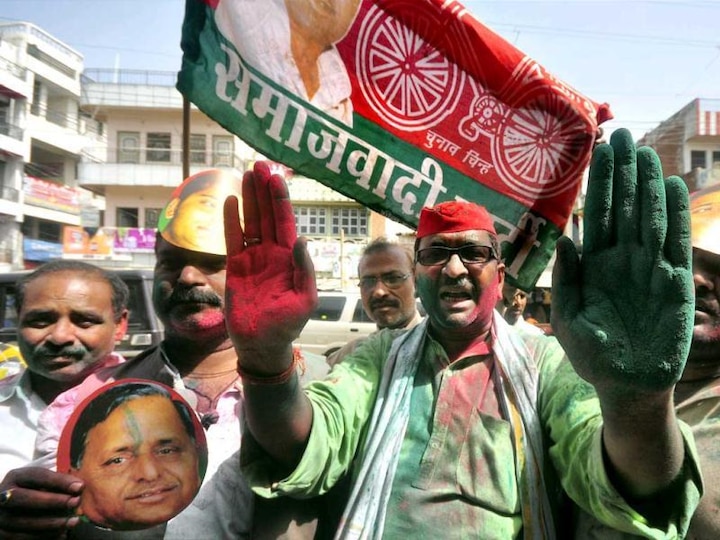Explorer
100 years on, Samajwadis claim to be Bolsheviks!

Image: Representational/PTI
In 1917, the Russian revolution brought socialism to eastern Europe and influenced political thinking across a larger geography. China was not immediately or directly impacted by this tumultuous event, but India was. The socialist movement got seeded in the country post-1917. And yet, a hundred years later, while socialism as an ideology drives governance in China, it’s a lost cause in India.
At the 19th National Congress of the Communist Party of China which concluded recently, President Xi Jinping called for ‘advancing socialism with Chinese characteristics’ and added that the country had now entered a “new era”. In his marathon more than three-hour long speech, Xi said, “We must work with resolve and tenacity and write a brilliant chapter on our new journey to socialist modernisation.”
Taking his socialist-oriented address forward, the President resolved to “strive for the great success of socialism… and work tirelessly to realise the Chinese dream of national rejuvenation”. The idea, he reminded the gathering of party leaders, was to turn China into a “great modern socialist country”.
It’s something of an achievement for any call to promote socialism in an era where socialists across the world are seen to have failed, to be hailed as modernistic. Chinese commentators have praised President Xi’s speech as “forward-looking” and “far-sighted” for two main reasons, The first is that the leader emphasised more on the people than on the party. And the second is because President Xi inter-wove ‘modern concepts’ such as the Belt and Road Initiative, economic reforms and crackdown on corruption into his socialist agenda.
In India, the socialist sapling has withered over the decades, perhaps because it was nurtured with the wrong fertilisers or by the wrong hands. Since independence, only a handful of socialist parties emerged, and none flourished. The Praja Socialist Party and the Revolutionary Socialist Party faded over the years. The only relatively strong one remaining in circulation today is the Samajwadi Party. But it is socialist in name only, since it was founded on caste politics and remains rooted to that even in the present. Besides, it has largely a regional relevance.
The primary reason why no strong major socialist outfit could emerge nationally, is that the dominant political party since independence, the Congress, itself assumed socialist credentials and thus occupied the political space that may have existed for specialised socialism. Given its nationwide spread and appeal, the Congress easily stunted the growth of socialist outfits. Jawaharlal Nehru and many of his colleagues were overt socialists. Nehru shaped the country’s economic, foreign and defence policies along socialist lines. But those like Sardar Vallabhbhai Patel had no love lost for socialists.
The other influential political outfit was the Communist Party of India, from which later spun off the Communist Party of India (Marxist). The communists too claimed to be socialists and edged out the smaller competition. While the communists and the Congress were often at loggerheads — this became more so after the communist Government of EMS Namboodiripad in Kerala was dismissed by Nehru regime in the late 1950s — they also maintained a working relationship when it came to confronting ‘common dangers’. In any case, the communist-Congress combine left no chance for socialists to have their own political voice.
The communists in the country would want to have an automatic claim on socialist ideals. But die-hard Marxists across the world believe that socialism is only a stepping stone to the ultimate aim of Marxist rule. Neither Marx nor his immediate followers were great admirers of socialism. They believed it did not fully purge the capitalist mentality. Nonetheless, in India the Marxists have also paraded as socialists and few have called their bluff.
Despite their socialist tilt, neither Nehru nor his camp members insisted on a socialist Constitution. One reason for that was BR Ambedkar’s high stature and his no-nonsense attitude towards romantic idealism. With Ambedkar at the helm of framing the Constitution, the straitjacketing did not happen. But Indira Gandhi, less of a socialist and more of an opportunist, chose to go against the grain of wisdom which the framers of the Constitution had. Through a constitutional amendment Act of 1976, she had the word “socialist” inserted (along with “secular”) in the Preamble to the Constitution.
Earlier, for a brief moment it had seemed that the socialist-minded had finally found their leader outside of the monolithic Congress and the regressive communist ranks, in Ram Manohar Lohia. Although he came from the Congress stable, he rebelled against the party and associated himself with socialist organisations. He carved a position for himself by critiquing the Congress as well as the communists. He was wary of the communists who had aligned themselves with the Congress Socialist Party which he had founded. His problem was with the fundamentals of both the Congress and the communists.
But the Lohia influence was short-lived. He died in 1967, a time when his campaign for true socialist ideals was peaking and leaving Indira Gandhi ruffled. Other major socialist leaders such as Madhu Limaye and George Fernandes lived on, but they either coopted in the established political mainstream or left to lead semi-retired political lives.
That the Samajwadi Party should today claim the legacy of Lohia, the tallest socialist leader the country has had, itself tells the story of the decline of socialism in India.
(The writer is Visiting Fellow at Vivekananda International Foundation, political commentator and public affairs analyst)
Disclaimer: The opinions, beliefs and views expressed by the various authors and forum participants on this website are personal and do not reflect the opinions, beliefs and views of ABP News Network Pvt Ltd.
Follow Blog News on ABP Live for more latest stories and trending topics. Watch breaking news and top headlines online on ABP News LIVE TV
View More


























